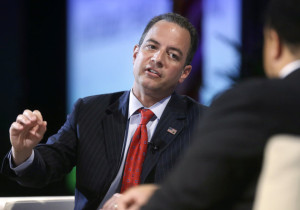
The Republican National Committee (RNC), following last week’s CNBC debate in which Republican presidential candidates were asked about their policies on the economy and on taxation policy, has suspended future involvement with NBC News and its affiliates for what the RNC describes as a debate held and moderated in “bad faith.”
Telemundo, the second-largest Spanish-language channel in the United States is part of the NBC News group and the next GOP debate in partnership with the news organization was scheduled to air on the network on February 26th. That broadcasting will no longer take place potentially disenfranchising millions of Spanish-speaking voters.
RNC Chairman Reince Priebus, in a letter to Andrew Lack, chairman of NBC News and MSNBC complained that “candidates were promised that speaking time would be carefully monitored to ensure fairness. That was not the case. Questions were inaccurate or downright offensive.” “I have tremendous respect for the First Amendment and freedom of the press. However, I also expect the media to host a substantive debate on consequential issues important to Americans. CNBC did not.”
While the RNC’s criticism of CNBC and the moderators has been met with sympathy on the right, the debate featured many instances of the candidates themselves squandering opportunities to present their agenda to the American people. Candidates repeatedly talked over the moderators, one another, and refused to directly answer questions during their time, instead deflecting and placing blame on the network for bias.
The RNC made the decision to suspend ties with NBC in consultation with the GOP campaigns.
The National Association of Latino Elected and Appointed Officials (NALEO) released a statement on the matter that read, in part, “we are extremely disappointed with the [RNC’s] decision to cut ties with the party’s only Spanish-Language network partner for the 2016 presidential primary debates. As the nation’s second largest population group, it is vital for candidates vying for the White House to directly address the issues and concerns of most importance to Latinos in both English and Spanish-Language network aired debates.”
With eligible Latino voters expected to number approximately 28 million throughout the United States, and in light of the GOP’s autopsy report following their defeat in the 2012 elections that called for a more inclusive party and greater attempts at outreach to minority groups, the RNC’s decision seems counter-productive to a winnable electoral strategy for 2016.
NALEO pointed out that “The Republican Party needs to engage with Latinos, especially through the Spanish-language network, given the recent anti-immigrant remarks made by some of the candidates.”

Recent Comments